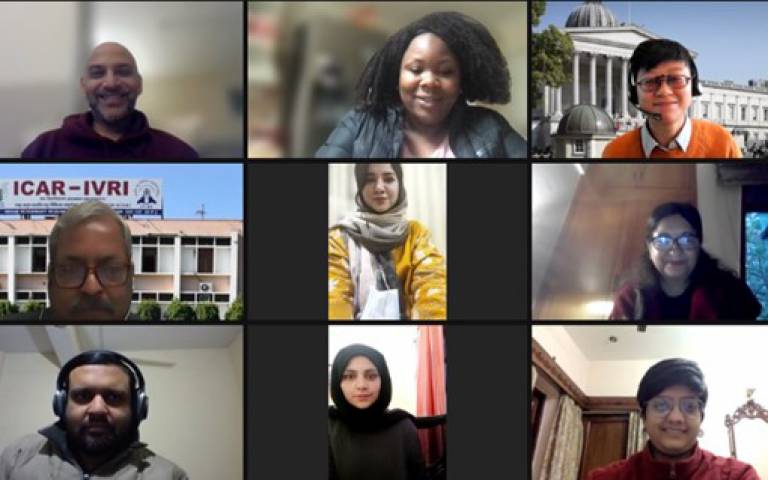Collaborating to improve STEMM gender equality in India
10 February 2022
UCL is partnering with higher education institutions in India to roll out the country’s first gender equality framework, improving opportunities for women in STEMM (science, technology, engineering, mathematics and medicine).

The university was one of six that successfully bid for funding to work with organisations across India as they apply for official accreditation through the country’s new Gender Advancement through Transforming Institutions (GATI) initiative.
On International Day of Women & Girls in Science (IDWGS) on 11 February, UCL is celebrating its work with five partners: the Indian Institute of Science; Indian Institute of Technology, Delhi; ICAR Indian Veterinary Research Institute; Indian Institute of Science Education & Research, Mohali; and the University of Kashmir.
GATI was established by the Government of India with the British Council, to counter the issue of gender disparity in STEM subjects and promote greater sensitisation.
Supported by UCL Global Engagement, the initiative builds on similar activity UCL is delivering with partners in Japan and Europe. It will help Indian higher education institutions (HEIs) and research organisations better support diversity and inclusion for talent progression, as well as addressing systemic challenges women face to participate in STEMM at all levels. It seeks to improve recruitment, retention, and support women’s progression throughout their careers.
Pro-Vice-Provost (South Asia), Professor Monica Lakhanpaul, said: "We are so pleased to be working with leading Indian institutions to remove barriers to women progressing in STEMM, as part of the GATI framework. The project team is already learning so much from our Indian partners that will also help UCL in its commitment to tackling gender disparity."
The UK partners will share best practice gained from the Athena Swan gender equality framework, of which UCL is a Silver institutional award holder.
UCL’s Envoy for Gender Equality, Professor Sara Mole (UCL Great Ormond Street Institute for Child Health), said: “We were delighted to be selected to deliver this work to improve gender equality in Indian HEIs. UCL has a deep commitment to gender equality, based on our founding principles of equal access to higher education. As a founding member of the Athena Swan Charter, we have much improved our gender equality though our long engagement with the process."
GATI mirrors the Athena Swan framework currently used across the globe, where applicants use self-assessment criteria to help identify areas for positive action as well as recognise and share good practice.
The UCL team has held several workshops with its Indian counterparts to discuss their approach and share best practice, as well as 1:1 sessions with institutions to support their work.
Professor Ravinder Kaur (Indian Institute of Technology, Delhi) said: “GATI is a timely and meaningful project, and we hope that its implementation will usher in a more gender-sensitive and gender-equal IIT Delhi. Being able to partner with other Indian institutions and UCL in the UK has enabled us to catalyse our work and draw on good practice elsewhere so that we focus on delivering the project effectively and efficiently whilst contextualising it to our own institutional and the Indian environment.”
Associate Professor Rabia Hamid (University of Kashmir) added: “GATI is a programme that has added value to 'gender perception', fostering women in STEMM for promotion and inclusion, and nurturing meritocracy irrespective of gender. It is imperative that girls and women should be contributing to science so that the society as a whole, can benefit.”
UCL received its first institutional Silver Athena Swan award in 2015 and successfully renewed it in 2021. There are also 43 awards currently held by UCL departments, the highest number of any UK higher education institution, including three at Gold level and 17 at Silver.
Celebrated every year, IDWGS campaigns for full and equal access and participation for women and girls in science.
For the latest news about UCL’s international activity, partnerships and opportunities, subscribe to the bimonthly Global Update newsletter.
 Close
Close

